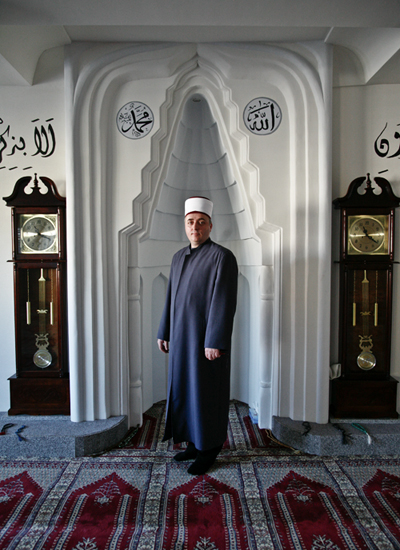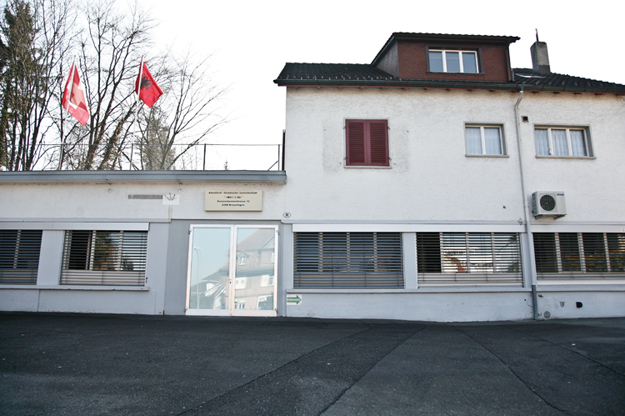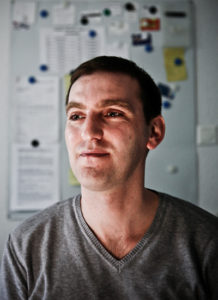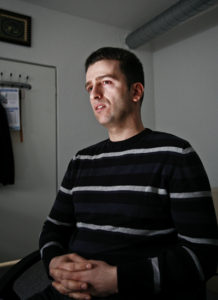There must be better places for being an imam than Switzerland. The small alpine country made international headlines in recent years thanks to a rise in Islamophobia. But Rejhan Neziri has no plans to leave. Quite the contrary: He wants to bring back trust and moderation. And he is willing to fight.
The 39-year-old imam is the head of the newly founded Union of Albanian Imams, a group of 30 Muslim clergy practicing in Switzerland, and his expectations are high: “We have to make our voice heard.” But achieving this is proving more difficult than anticipated.
In order to meet Neziri, I had to travel to the northeastern edge of the country. In the town of Kreuzlingen, overseeing the picturesque Lake Constance, I catch a glimpse of Germany on the other shore. There are numerous old, beautiful buildings and churches, but no sign of a mosque. It requires a long walk down the main street, all the way to the industrial area, to find it. The community mosque, Hëna e Re, or New Moon in Albanian, resides in an unpretentious, whitewashed family home, with translucent glass and a mailbox — a typical Swiss building. This house, harbouring a Muslim worship site within, perfectly symbolizes the situation of Muslims in Switzerland. Most Swiss mosques are spatially marginalized in industrial or commercial zones, sometimes they are in bare flats or basements. The Muslim communities tend to adapt and not stand out visually. Religion is considered a private issue here.

“Visitors are sometimes disappointed, as this is by no means the Blue Mosque,” a smirking Neziri says, referring to the famed holy site in Istanbul. He is happy with his mosque nonetheless. At the center of the house is a cafeteria, radiating warmth and coziness. A poster of the Sinan Pasha mosque in Prizren sticks at a wall, there are shelves full with books, and the place is full of people, drinking coffee, smoking, laughing. It’s Friday midday and people come here to socialize, to speak Albanian and to pray.
There are about 400,000 Muslims living in Switzerland, among a population of 7.8 million people. Most of the Muslims are Albanians from Macedonia, Kosovo and Albania. They have been living in the country since the 1970s, when Swiss companies discovered the Albanians as reliable and cheap migrant workers. Eventually, during the wars in the Balkans in the 1990s, Switzerland provided a safe and popular haven for many displaced Albanians.
But shortly after Sept. 11, 2001, and practically overnight, the perception of Albanians in the eye of the Swiss public changed. At once, they were no longer perceived as part of the Balkan community, but simply as Muslims. “Suddenly we were seen different, even though we were there for 30 years,” says Neziri, who comes from Macedonia and has lived in Switzerland for the past 10 years. In the fear-driven aftermath of the terrorist attacks in the United States, politicians and the media started putting pressure on Muslim communities, demanding them to dissociate themselves from the terrorist acts of Islamic fundamentalists.
Right’s rise stokes radical embers
But there was also a different kind of reaction. Young Muslims felt especially offended by the harsh rhetoric of the right-wing politicians and the one-sided coverage by the mainstream media — and the ignorance of their own community leaders. In the following years, another group was formed, and it was soon to dominate the debate about the practice of the Islamic faith — the Islamic Central Council of Switzerland (IZRS). Led by the Swiss student and convert Nicolas Blancho, they claim to stand for a more radical Islam in the conservative tradition of puritanical Salafisism.
The IZRS is also getting more attention from young Muslims than any other organization, by spreading their message through social media such as Facebook, Twitter and YouTube, organizing events including the annual “Ummah Day,” a popular congress for young Muslims, and provoking the public with radical statements led to the group’s membership rising to about 2,000 — and attracting much media attention. This peculiar movement was one of the reasons to build the Union of Albanian Imams, Neziri says, “although it is not thought as a counter-initiative.”

In his almost Swiss-like diplomacy, Neziri does not condemn Blancho and his young radicals. But he is concerned that their message is reaching a wider audience: “The people from IZRS speak German, most of our imams don’t. Blancho speaks in the name of all Muslims, our imams don’t. Blancho is a popular figure in mainstream media, our imams are not.”
A look inside the Muslim community
Inside the Albanian mosque in Keuzlingen, people are getting ready to pray. The midday sun fills the big prayer room, beautifully crafted ornaments embellish the walls, there is a faint smell of air freshener. About 200 men trickle in, old and young, shaved and bearded, Swiss, Albanian, Turkish and Pakistani. A huge group of men in their 20s are laughing at a joke. Then, their imam, Neziri, enters the room, and they pray like most Muslims do, everyone in their own rhythms.
At the coffee table afterward, community members are eager to share their perspective. Muhamet Ziberi, 29, and Jetmir Kasami, 30, are two of them. Both are well-respected in the community of Hena e Re and in the city of Kreuzlingen. Kasami works as a bank consultant and Ziberi at the local post office, and even volunteers as a firefighter. “We are lucky to have this mosque,” Ziberi says. “A lot of young Albanians come here because they want to hear the imam preaching in German.”

They say they feel fully accepted and don’t care about the debate on the position of Islam in Switzerland. Only in recent years, people started reacting to them, asking questions about their religious beliefs. “Some say: Oh, you’re Muslim? But I’ve known you for 10 years!” But they say they’ve never had any bad experiences. It is a phenomenon that is common throughout Switzerland. The bigger the Muslim community is in a region, the smaller Islamophobia tends to be there.
And the group of young radicals? “We don’t care about them,” Kasami says. In Ziberi’s opinion, they do nothing wrong: “They spread the idea of Islam and of unity. That’s a good thing.”
To put young people under pressure to choose a side would make no sense, Ziberi says. “You don’t have to decide to be either Swiss or Albanian or Muslim. You can be all of it.”
A broader role for Albanian imams
A study from 2009 by the Swiss National Founds shows, that the huge majority of Muslims living in Switzerland want their imams to be educated in Switzerland. “We think that this a necessity,” Neziri says. “You cannot migrate and live for 20 years in Switzerland without participating and knowing the local language. That’s counterproductive, especially for us Muslims.”
 Neziri is looking beyond the basic religious roles of the imam as a preacher and interpreter of the Quran. The Union of Albanian Imams wants these religious leaders to serve as role models and connectors for society, the wants to focus on this. “We have to build up trustful relationships with the municipalities, the school administrations, the representatives of other religions.” Language is the key for the Albanian imams to connect, Neziri says. So far, only a tiny fraction of the imams speak one of the official Swiss languages fluently: German, French, Italian or Romansch.
Neziri is looking beyond the basic religious roles of the imam as a preacher and interpreter of the Quran. The Union of Albanian Imams wants these religious leaders to serve as role models and connectors for society, the wants to focus on this. “We have to build up trustful relationships with the municipalities, the school administrations, the representatives of other religions.” Language is the key for the Albanian imams to connect, Neziri says. So far, only a tiny fraction of the imams speak one of the official Swiss languages fluently: German, French, Italian or Romansch. The UAI is organizing classes for language, culture and politics. The imams are starting to preach in German — Neziri has been doing it for several years, and he is receiving positive feedback in response. “Suddenly, there are a lot more young people coming,” he says.
The UAI is organizing classes for language, culture and politics. The imams are starting to preach in German — Neziri has been doing it for several years, and he is receiving positive feedback in response. “Suddenly, there are a lot more young people coming,” he says.
Many second-generation Swiss-Albanians are not fluent in Albanian, so they are happy to hear Neziri’s sermons in German. Also, this opens the mosque for non-Albanians. “We notice more Arabs, Bosniaks, Kurds or Pakistanis attending, especially on Fridays,” Neziri adds.
It is by organizing themselves and getting educated that the Albanian Muslim community is getting ready for the upcoming debate. Right-wing politicians already announced a new campaign against all things Islam. Now they will no longer turn away and let the radicals speak for all Muslims. Now they will let their voice be heard.
“There was a time in Switzerland, when people were creating a bad image of Italian immigrants,” Kasami, the bank consultant, says. “Now they are perfectly integrated and tolerated. The same will happen for Muslims. In 10 years time, the Albanians will be role models of integration.”

